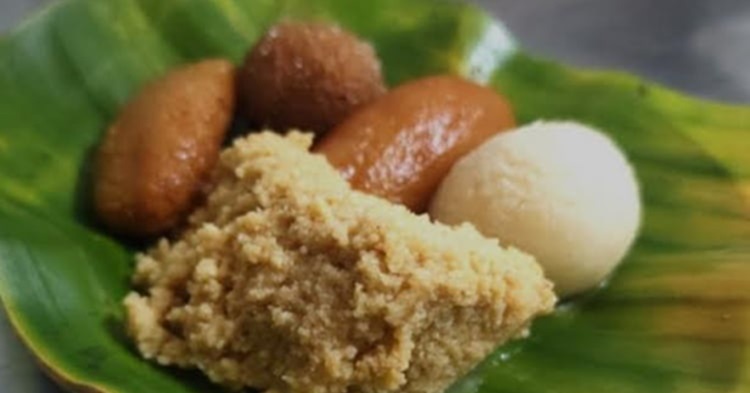Indramohan Sweets, a century-old tradition wrapped in banana leaves in Khulna


Khulna is known for its rich culinary heritage, where several food spots reflect the city's culture and history. Among these, Indramohan Sweets stands out as a timeless treasure, preserving a 135-year-old tradition of making authentic Bengali sweets the old-fashioned way.
As evening falls over Khulna's narrow Boro Bazar lanes, a sweet aroma fills the air and draws visitors to a small, unassuming shop. Indramohan Sweets offers just four classic treats-pantua, roshogolla, sandesh, and chomchom-served simply on banana leaves without any flashy packaging.
Inside the modest shop, sweets are laid out on a thick wooden table with steel plates ready for customers. The blend of fresh chhana (curdled milk) and pure sugar creates a flavor that has kept generations coming back, making Indramohan Sweets a royal name in Khulna's sweet landscape.
Established in 1890, the family-run business makes indescribably delicious sweets and makes sure you do not have to spend much.
Basked in sugary syrup, their roshogolla offers a pure, fragrant, and blissful experience; their shondesh, served on a banana leaf, makes you daydream from the very first bite.
This humble store has been selling sweets wrapped in banana leaves for 135 years, started by a sweet maker named Indramohan Dey, who opened it in a rented space on Helatola Road.
Back then, under British rule, Khulna was a busy trading hub via the river. Though times have changed the taste and preparation of sweets elsewhere, time seems frozen in Indramohan's shop.
Here, sweets are still sold by piece, not by weight. They're still served on banana leaves, and there are no spoons-you eat with your hands.
The shop is now run by Indramohan's grandson, Sanjay Dey, who spoke with quiet pride to BSS on Tuesday, "No matter how glamorous the new shops are, people come to us for the taste."
"Every day, we bring pure cow's milk to make fresh chhana. With 50-60 kg of it, we make pantua, roshogolla, and sandesh. No semolina or flour, only pure ingredients, with a little egg and baking powder for that soft, melt-in-the-mouth pantua," he said.
Every day, around 300-400 pieces of pantua and 100-150 kg of sandesh are sold. Each roshogolla or pantua costs Taka 20, while sandesh is priced at Taka 400 per kilogram. In the evenings, sweet lovers crowd the shop for freshly made hot roshogolla and pantua, he added.
This commitment to purity has lasted through history, making the shop a witness to countless moments from the British era, through the Pakistan period, to present times.
On February 13, 2019, Earl Robert Miller, the then U.S. Ambassador to Bangladesh, visited the shop and tasted its legendary sweets during a trip to Khulna.
Kamal Chandra Sarker, a sweet maker, has been at the heart of this legacy for the last 44 years.
Talking to BSS, he said, "We've never sold stale sweets here. Everything we make is sold the same day. That rule has never changed."
In a market where food is dressed up with advertisements and visual appeal, Indramohan Sweets stands firmly in contrast. No social media spotlight, no digital campaigns. What it has instead is loyal, familiar faces, the aroma passed down generation to generation, and the one sentence that keeps people coming back-"Indramohan's pantua melts in your mouth."
Sweet lovers across the country, while visiting Khulna city, try to taste Indramohan sweets and buy them for their near and dear ones.
Elderly Professor Anwarul Kadir, Director of Sundarban Academy, recounts the heritage of the sweets.
"During the decades of the 70s and 80s, I, along with my friends, gathered here and tasted these pure sweets."
Contacted another elder man, Molla Shamsur Rahman, a businessman of Helatala Road, shared his experience with BSS, "We could not think of any occasion, including marriage ceremonies, without Indramohan Sweets in my childhood during the 60s and 70s.
"When I eat them now sometimes, it seems to me the same taste, flavor, and feelings," he recounts.
